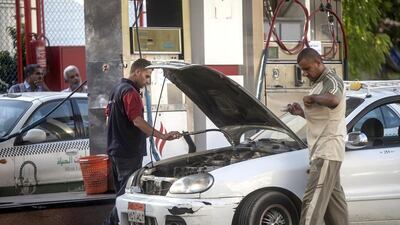Egyptian prices continued their upwards path this month, driven by the government’s cuts to fuel subsidies, and raising the spectre of a long period of low growth and high inflation.
The price rises threaten to filter through to living standards, and to reduce the attractiveness of government debt, which many Egyptian retail banks have significant holdings of.
Two key price indices rose half a per cent each, as the end of fuel subsidies pushed up the price of transport.
Overall inflation rose to 11.5 per cent from 11 per cent, while core inflation, which excludes the fruit and vegetables and regulated prices, rose to 10.07 per cent from 9.57 per cent, according to data released by Egypt’s Central Bank.
The price of transport, which rose 28.1 per cent year on year, was the biggest contributor to inflation.
This follows the ending of subsidies on a number of energy prices that has resulted in petrol prices increasing by as much as 77 per cent.
In August’s Purchasing Managers’ Index, a monthly survey of Egyptian business leaders, one third of respondents said that they had seen increases in the price of inputs over the previous month.
“The main contributor to the spike in inflation … was transport prices, which reflects the impact that energy subsidy reforms are having on price levels across the economy,” said Jean-Paul Pigat, an economist at Emirates NBD, in a research note.
Per capita economic growth stands at about 0.4 per cent, based on growth projections from the IMF and population projections.
This means that even a small uptick in the price level is likely to lead to an overall reduction in living standards, harming poverty reduction in a country where about 60 per cent of the population lives on less than $4 per day.
Meanwhile, yields on 5-year and 10-year Egyptian government debt have risen over the last few months, in an indication that inflationary expectations are increasing.
The average yield on 5-year bills has increased to 14.8 per cent at an auction on September 9 from 13.5 per cent on July 15, while 10-year bills increased to 16.0 per cent from 15.6 per cent on July 15th.
Egyptian retail banks have reported negligible increases in loans made to businesses, despite an rise in deposits made, as they plough money into government bonds.
But with an increasing inflation rate, a declining currency, and a 20 per cent tax charged on coupon payments from government bonds, it is likely that the real rate of return on newly auctioned treasuries will head below zero, cutting into the strength of Egyptian banks’ balance sheets.
abouyamourn@thenational.ae
Follow The National's Business section on Twitter

